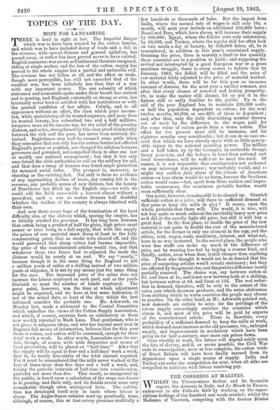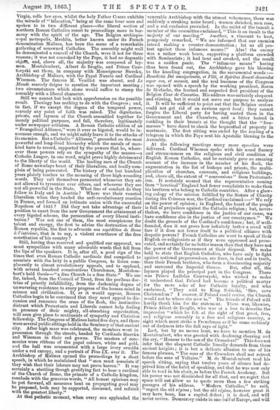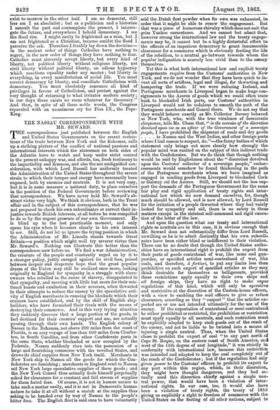THE CONGRESS AT MALINES.
WHILST the Ultramontane faction and its favourite organs, the Armenia in Italy, and Le Afonde in France, endeavour to stir Catholic faith by working on the super- stitious feelings of the fanatical and weak-minded ; whilst the Madonna of Vicovaro, competing with the famous Rimini Virgin, rolls her eyes, whilst the holy Father Cesare exhibits the miracle of " bilocation," being at the same hour seen and spoken to in two different places—the liberal section of northern Roman Catholics resort to proceedings more in har- mony with the spirit of the age. The Belgian archiepis- 'copal metropolis, Mechlin, better known under its French denomination Malines, has been the scene of a remarkable gathering of renowned Catholics. The assembly might well be denominated a council of the Church, were it not for three reasons; it was not convoked by the Pope, it had no dogmatic objeet, and, above all, the majority was composed of lay- men. Montalembert, Albert de Broglie, and Prince Czar- toryski sat there, in company with Monseigneur Sterckx, Archbishop of Malines, with the Papal Nuncio and Cardinal Wiseman. The famous M. Veuillot was absent, and Le Monde scarcely deigns to mention the important meeting ; two circumstances which alone would suffice to stamp the assembly with a liberal character. Still we cannot but look with apprehension on the possible result. Theology has nothing to do with the Congress ; and, in fact, if we except the dogma of the temporal power, scarcely any point of faith was raised. The dignitaries, priests, and laymen of the Church assembled together for merely political purposes, and fall, therefore, legitimately under newspaper criticism. A Roman Catholic edition of an Evangelical Alliance," were it ever so bigoted, would be in: nocuous enough, and we might safely leave it to the attacks of its enemies. But a Catholic "Alliance," grounded on the most powerful and long-lived hierarchy which the annals of man- kind have to record, supported by the powers that be, where- ever these powers rely on the sympathy of the masses—a Catholic League, in one word, might prove highly detrimental to the liberty of the world. The leading men of the Church of Rome nowadays boast of their liberalism, and loudly com- plain of being persecuted. The history of the last hundred years plainly teaches us the meaning of those high-sounding words. They call themselves persecuted whenever they are not allowed to tyrannize over others, and wherever they are not all-powerful in the State. What line of conduct do they follow in Italy and in Austria ? 'Where was their vaunted liberalism when they headed the anti-revolutionary reaction in France, and formed an intimate union with the successful Napoleon of l851 ? Did they not take advantage of their position to exact from the new Government the attainment of every bigoted scheme, the persecution of every liberal insti- tution? Was not one of them, the most conspicuous for talent and energy, the first to advise the destruction of the Roman republic, the first to advocate tine expedition de Rome a rintirietir,-that is to say, a violent overthrow of the free constitution of his country ?
Still, having thus reserved and qualified our approval, we must sympathize with many admirable words that fell from the lips of the speakers. It is, after all, a good sign of the times that even Roman Catholic cardinals feel compelled to associate with the laity in a public Congress, to listen com- placently to almost revolutionary appeals, and to applaud, with several hundred conscientious Churchmen, Montalem- bert's bold thesis—" a free Church in a free State." We are far, indeed, from the Council of Trent, from the perilous doc- trine of priestly infallibility, from the darkening dogma of unwavering resistance to every progress of the human mind in science and civilization. If, as it would appear, Roman Catholics begin to be convinced that they must appeal to dis- cussion and renounce the arms of the flesh, the instinctive distrust which Protestants and Liberals cannot help feeling in presence of their mighty, all-absorbing organization, will soon give place to sentiments of sympathy and Christian fellowship. The Congress of Malines lasted five days, and there were several public sittings held in the Seminary of that ancient city. After high mass was celebrated, the members went in procession through the streets, headed by Cardinals Sterckx and Wiseman in their red gowns. The masters of cere- monies wore ribbons of the papal colours, white and gold, and the hall was ornamented with a large ivory crucifix under a red canopy, and a portrait of Pius IX. over it. The Archbishop of Matinee opened the proceedings by a short speech, in which he maintained that "men must associate if they wish that their labours may not prove barren." It was certainly a startling though gratifying fact to hear a cardinal of the Church of Rome, the primate of a Catholic kingdom, conclude with the generous words, "All honest opinions may be pat forward, all measures bent on propagating good may be proposed, both may be supported, discussed, and refuted with the greatest liberty." At that pathetic moment, when every one applauded the venerable Archbishop with the utmost vehemence, there was suddenly a creaking noise heard ; women shrieked, men rose, and a sad confusion prevailed. In the midst of the tumult a member of the committee exclaimed, "This is an insult to the majesty of our meeting." .Another, a viscount to boot, pompously remarked, • " We are informed that our enemies intend making a counter-demonstration ; let us all pro- test against these infamous means!" Alas ! the enemy was a rather weak beam, supporting a platform crowded with Seminarists ; it had bent and creaked, and the result was a sudden panic. The "infamous moans" having thus been found out, the Archbishop gave his blessing to the kneeling congregation, in the sacramental words :— Benedictio Dei omnipotentis, et Filii, a Spiritus Sancti descendat super vos, et maneat, and the real business of the Congress was opened with a speech by the working president, Baron de Gerlache, the learned and respected first president of the Belgian Cour de Cassation. His address was certainly eloquent and stirring, but it would not serve our purpose to analyze it. It will be sufficient to point out that the Belgian orators could. not get rid of an envious esprit local ; they cannot forgive the Liberal party for having ousted them in the Government and the Chambers, and a bitter hatred is rankling in their breasts at the thought that the " free- masons " have dared to check the bequeathal of property in mortmain. The first sitting was ended by the reading of a telegram in which the Pope sent his Apostolic blessing to the Assembly.
At the following meetings many more speeches were delivered. Cardinal Wiseman spoke with his usual fluency and strenuousness on the religious and civil condition of English Roman Catholics, and he certainly gave an amazing account of the increase in the number of his flock, the augmentation in the list of bishops and priests, the multi- plication of churches, convents, and religious buildings, and, above all, the extent of " conversions " from Protestant- ism. It certainly seemed that the representative coming from "heretical" England had fewer complaints to make than his brethren who belong to Catholic countries. After a glow- ing eulogy of the mission fulfilled by the Sisters of Charity during the Crimean war, the Cardinal exclaimed :—" We rely on the power of opinion ; in England, the heart of the people is full of prejudices against the Catholic religion ; but, never- theless, we have confidence in the justice of our cause, we have confidence also in the justice of our countrymen." We doubt the grounds of the Cardinal's confidence; but, if well- founded, does it not prove how infinitely better a creed will fare if it does not lower itself to a political alliance with despotic powers? French Catholics are wont to speak of their English co-religionists as if they were oppressed and perse- cuted, and certainly for no better reason than that they have not the power of the Government at their disposal. We make bold to state that English Catholics, who have only to fight against national prepossessions, arc freer, in fact and in truth, than their French brethren, who form a domineering majority and surround the Imperial throne. But, after all, the laymen played the principal part in the Congress. There was Prince Ladislas Czartoryski, who wished to make it understood that Po!and had become a political martyr for the mere sake of her Catholic loyalty, and who exclaimed, "They said to King Sobieski, Sire, save Christendom !' I answer, if Poland could revive, the Church would not be where she now is." The friends of Poland will hardly thank him for the statement. There was, likewise, Prince Albert de Broglie, who was at a loss to describe the impression "which he felt at the sight of that great, free, and religious assembly in a free and religious country, a sight which must strike a Frenchman as if he came suddenly out of darkness into the full rays of light."
Last, but by no means least, we have to mention M. de Montalembert, who was greeted with deafening cheering and. the cry, "Honour to the son of the Crusaders!" This does not infer that the eloquent Catholic lineally descends from these ancient knights ; it is but a delicate allusion to one of his famous phrases, "The sons of the Crusaders shall not retreat before the sons of Voltaire." M. de Montalembert read his speech sitting, saying that twelve years of silence had de- prived him of the habit of speaking, and that he was now only able to read in his chair, as before the French Academy. But his power was not diminished for all that, and we regret that space will not allow us to quote more than a few striking passages of his address. "Modern Catholics," be said, "regret the old regime; but the old regime, however great it may have been, has a capital defect ; it is dead, and will never revive. Democracy exists in one-half of Europe, and will exist to-morrow in the other half. I am no democrat, still less am I an absolutist ; but as a politician and a historian I consult the past and contemplate the present, I interro- gate the future, and everywhere I behold democracy. I see the flood rise. I might easily be frightened as a man, but I am not frightened as a Christian, because amidst the flood I perceive the ark. Therefore I frankly lay down the doctrine— in the ancient order of things Catholics have nothing to regret, in the new order of things they have nothing to fear. Catholics must sincerely accept liberty, but every kind of liberty, not political liberty without religious liberty, not civil liberty without political liberty, an odious hypocrisy which sanctions equality under any master ; but liberty in everything, in every manifestation of social life. You must correct democracy by liberty, and conciliate Catholicism with democracy. You must absolutely renounce all kind of privileges in favour of Catholicism, and protest against the very thought of returning to what irritates modern society ; in our days there exists no room whatever for theocracy." And then, in spite of all these noble words, the Congress separated with an unanimous cry for Pius IX., the Pope- Xing.
































 Previous page
Previous page